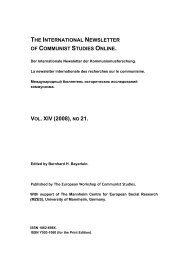11RXNdQ
11RXNdQ
11RXNdQ
Create successful ePaper yourself
Turn your PDF publications into a flip-book with our unique Google optimized e-Paper software.
Colonialism and Neocolonialism 38<br />
and the victim – the second is no more than a manifestation of the first. And, without any<br />
doubt, the torturers are not colonists, nor are the colonists torturers. The latter are<br />
frequently young men who come from France and who have lived twenty years of their<br />
life without ever worrying about the Algerian problem. But the hatred was a magnetic<br />
field: it passed through, corroded, and subjected them.<br />
It is the calm lucidity of Alleg that allows us to understand all that. Even if he<br />
contributed nothing else, we would have to be profoundly grateful to him. But he did<br />
much more: by intimidating his torturers, he ensured that the humanism of the victims<br />
and the colonized triumphed over the excessive violence of certain soldiers and the<br />
racism of the colonists. And let not the word ‘victim’ evoke any kind of tearful<br />
humanism: in the midst of these little chiefs, proud of their youth, their strength, their<br />
number, Alleg is the only hard man, the only one who is really strong. We may say that<br />
he paid the highest price for the simple right to remain a man among men. But he does<br />
not even think about it. That is why we are so moved by this sentence without affectation<br />
at the end of a paragraph:<br />
‘I felt suddenly proud and joyful at not having given in; I was convinced that I would<br />
hold out if they started again, that I would fight to the end, that I would not make their<br />
task easier by committing suicide.’<br />
A hard man, yes, and one who ended up frightening the archangels of anger.<br />
In some of their words, at any rate, you feel that they sense and are trying to ward off a<br />
vague and scandalous revelation: when it is the victim who wins, farewell to supremacy<br />
and to the droit du seigneur; the archangelic wings stiffen and the lads ask themselves,<br />
embarrassed, ‘What about me? Would I hold out if I were tortured?’ Here, at the moment<br />
of victory, one system of values has been replaced by another; the torturers, in their turn,<br />
come within an ace of feeling dizzy. But no, their heads are empty and their work<br />
exhausts them, and after all they scarcely believe in what they are doing.<br />
Besides, what is the use of troubling the conscience of the torturers? If one of them<br />
faltered, his superiors would replace him: there are plenty more where they came from.<br />
Alleg’s account in effect – and this is perhaps its greatest merit – finally dispels our<br />
illusions: no, it is not enough to punish or re-educate a few individuals; no, the Algerian<br />
war will not be humanized. Torture has established itself there: it was prompted by<br />
circumstances and required by racist hatred; in a certain manner, as we have seen, it is at<br />
the heart of the conflict and is, perhaps, what expresses its deepest truth. If we want to put<br />
an end to this revolting, dismal cruelty, save France from shame and the Algerians from<br />
hell, we have only one means, still the same, the only one we have ever had or will ever<br />
have: begin negotiations, make peace.




